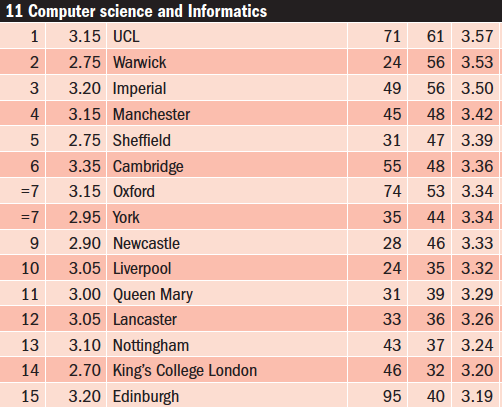Computer Science News
The Alan Turing Institute and Intel to form Strategic Partnership
The Alan Turing Institute and Intel have agreed to form a long term strategic partnership to deliver a research programme focussed on high-performance computing and data analytics.
Researchers from both organisations will work together on the programme alongside co-funded research fellows and software engineers.
Launched this month at the British Library, the Alan Turing Institute research team includes members of the University of Warwick’s Departments of Statistics, Computer Science, Institute of Mathematics, Warwick Data Science Institute, and WMG’s Cyber Security Centre.
In addition, Intel will dedicate a hardware architecture team at the Institute’s facilities so that new algorithms developed by The Alan Turing Institute feed into the design of Intel’s future generations of microprocessors.
As well as conducting research, the partnership will train a new generation of data scientists through The Alan Turing Institute’s doctoral programme, ensuring students are equipped with the latest data science techniques, tools, and methodologies.
Minister for Universities and Science, Jo Johnson
Government is committed to ensuring the UK is the best place in Europe to innovate, patent new ideas and start a business. Big data offers huge potential for innovation which is why Government invested £42m in The Alan Turing Institute to secure the UK’s future in this important field.
I welcome this new strategic partnership with Intel which is testament to the strength of the UK’s research base and an exciting opportunity for growth in our digital economy.
Professor Andrew Blake, Director of The Alan Turing Institute
Intel is a global leader in computing innovation and I am delighted that it has become a strategic partner. This is a great development for the Institute and for data science globally.
Alan Turing was one of the first people to build an electronic computer. The partnership with Intel means that, true to his legacy, the Institute named after him will be contributing to the design of future generations of computers.
The goal of The Alan Turing Institute is to drive scientific and technological discoveries in the use of big data and algorithms, which will create new business opportunities, and accelerate solutions to global challenges. We have, today, taken a significant step towards that goal.
Christian Morales, Corporate Vice President, General Manager Intel EMEA
The Data Scientist is a very captivating and crucial job of the 21st century. With the right combination of people and technology, Big Data has the potential to solve big problems in public health, medicine, science, agriculture and engineering. We are committed to helping The Alan Turing Institute develop a fertile breeding ground for data scientists, with the greater purpose of driving critical data analytics across all industries.
The Alan Turing Institute is a joint venture between the universities of Warwick, Cambridge, Edinburgh, Oxford, UCL and the Engineering and Physical Sciences Research Council (EPSRC). The Institute will promote the development and use of advanced mathematics, computer science, algorithms and big data for human benefit.
DIMAP Logic Day 2015

On June 1st 2015, our Division of Theory and Foundations, jointly with DIMAP, organized DIMAP Logic Day 2015. The goal of the event was to bring together the UK community of researchers and graduate students interested in the study of logics, automata and games.
The event had an outstanding list of invited speakers from leading academic institutions and research labs (Nathalie Bertrand, INRIA Rennes; Antonin Kucera, Brno; Slawomir Lasota, Warsaw; Davide Sangiorgi, Bologna, INRIA Sophia Antipolis; Sylvain Schmitz, Cachan, INRIA Saclay, Warwick; James Worrell, Oxford) presenting recent advances in logic in computer science, and attracted over 40 participants from the UK and abroad.
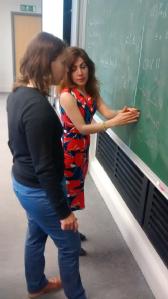
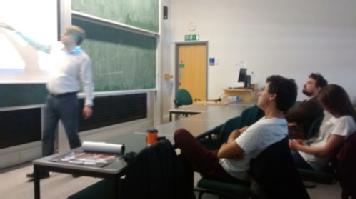
Graham Cormode and Dan Kral awarded ERC Consolidator grants
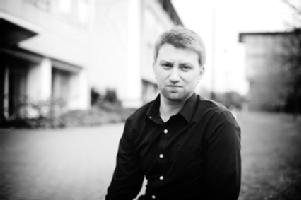

The European Research Council (ERC) has just announced that two Warwick Computer Science Professors, Graham Cormode and Dan Kráľ, have been among the winners of its Consolidator Grant competition. ERC Consolidator Grants is funding 372 top mid-career scientists with €713 million to pursue their best ideas, as part of the European Union Research and Innovation programme Horizon 2020. Grants are worth up to €2.75 million each, with an average of €1.91 million per grant. The funding will enable them to consolidate their research teams and to develop their most innovative ideas.
Graham Cormode has been awarded an ERC Consolidator grant for a project entitled "Small Summaries for Big Data". The project focuses on the area of the design and analysis of compact summaries: data structures which capture key features of the data, and which can be created effectively over distributed data sets. The project will substantially advance the state of the art in data summarization, to the point where accurate and effective summaries are available for a wide array of problems, and can be used seamlessly in applications that process big data.
Dan Kráľ has been awarded an ERC Consolidator grant for a project entitled "Large Discrete Structures". The project will advance theory of combinatorial limits, which combines methods from analysis, combinatorics, computer science, group theory and probability theory to analyze and approximate large discrete structures (such as graphs, which can be used to represent large computer networks). The project will lead to proposing new mathematical methods to represent such discrete structures and to applications of the new methods to specific problems in extremal combinatorics and algorithm design.
EATCS Fellowship for Artur Czumaj
Professor Artur Czumaj has been made an EATCS Fellow for "contributions to analysis and design of algorithms, especially to understanding the role of randomization in computer science”.
Dr Sylvain Schmitz joins DCS as Leverhulme Visiting Professor
The department and DIMAP are delighted to welcome Sylvain Schmitz from LSV, ENS Cachan, CNRS and INRIA Saclay, who has joined us this week as Leverhulme Visiting Professor.
Funded by the Leverhulme Trust, Dr Schmitz will spend 6 months at Warwick, collaborating with Dr Ranko Lazic and other colleagues on logics and games for algorithmic verification, and delivering three research lectures.
Warwick University to partner in new Alan Turing Institute
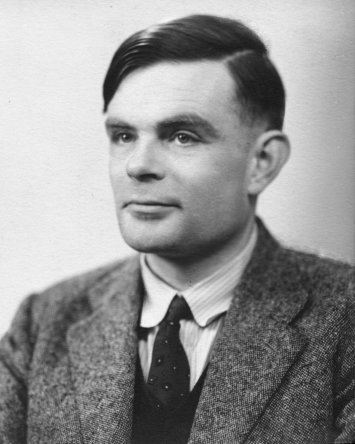
Warwick University is one of only five universities to have been considered worthy of establishing the prestigious £42m Alan Turing Institute for Data Science, thanks to our hard-earned reputation for world-class research.
This means our exceptional researchers from Mathematical Sciences will be at the forefront of the UK’s approach to big data. We’ll help the Institute to meet society’s toughest challenges, and strengthen the links between academia and technology industries.
Using the headquarters at the British Library in London as a base, we’ll use our research strength - as demonstrated by our excellent Research Excellence Framework (REF) performance - to fully exploit the trends and patterns found within huge data sets.
Warwick’s existing activities in data science are already significant. This includes two major EPSRC-funded Science and Innovation centres: Centre for Research in Statistical Methodology and the Centre for Discrete Mathematics and Applications. It also includes three of the new Centres for Doctoral Training (Oxford and Warwick Statistical Programme, Mathematics for Real-World Systems, and Urban Science and Progress), all of which will train highly qualified PhD students in big data and complex modelling. Warwick also holds 3 EPSRC 5-year Programme Grants relevant to this area, and is the only university in the UK to teach an undergraduate degree course in Data Science; Computer Science also leads the highly successful MSc in Data Analytics.
By working alongside the very best, we’ll make the UK a world leader in big data.
What does this mean for Warwick?
The Institute will bring together leaders in advanced mathematics and computing science from the five lead universities and other partners. Its work is expected to encompass a wide range of scientific disciplines and be relevant to a wide range of business sectors.
Professor Stephen Jarvis, Head of Department, Computer Science said:
We are delighted to have been selected as one of the five universities that will establish the world-leading Alan Turing Institute. Mathematical Sciences (Mathematics, Statistics and Computer Science) at Warwick are extremely strong; all three Departments are ranked in the Top 3 for research in the country.
The Turing Institute will be a magnet for world-leading research and application in data science. We are thrilled to be able to shape that future through Warwick’s engagement, and look forward to the many benefits to our postgraduate and undergraduate programmes as a result.
The announcement of our involvement in the Alan Turing Institute is undoubtedly good news, but what does it mean for Warwick? Professor Tim Jones, Pro-Vice Chancellor for Science, Engineering and Medicine explains:
It means Warwick is right at the top table in the area of data science. This is the UK’s strategic priority to pull together the best academics and other partners across the country to tackle the challenges of big data and to exploit the opportunities. There are four other universities in the Institute – Oxford, Cambridge, Edinburgh and UCL – and Warwick will be the fifth. I think that’s a great measure for the quality of our work in the area.
What is Big Data?
Big Data is one of the areas where our research excels thanks, in part, to our world leading mathematics, computer science and statistics departments. Warwick has long prized itself on using interdisciplinary and multidisciplinary approaches to answer the pressing questions of our time, and, as big data throws up such questions, that expertise comes to the fore.
Find out more about what Big Data means at Warwick
Or follow the conversation on twitter at #warwickturing
Warwick Computer Science Ranked 2nd in UK Research Assessment
UK universities are evaluated on the quality of their research every six years. The results of the 2014 Research Excellence Framework (REF), announced by the Higher Education Funding Council today, rank Warwick Computer Science 2nd out of 89 UK computing departments.
REF assesses the quality of research outputs (academic papers, software, etc.) and the impact that this research has had (including improvements to society and business). Warwick’s output was ranked the best in the country, while its research impact was ranked joint second (with the University of Cambridge).
Professor Stephen Jarvis, Chair of the Department of Computer Science, commented:
We are delighted with this result. Warwick Computer Science produces world-leading research, both in the theoretical underpinnings of computer science and in its translation to real-world problems. Our work over the past six years has created new businesses, developed new standards, generated IP for new products, underpinned national security and defence, and impacted on social policy in education and health.
This result comes on the back of an excellent year. Warwick has been named University of the Year in The Times and Sunday Times Good University Guide 2015, and Warwick Computer Science was recently ranked as one of the best departments in the world in the 2014 QS Worldwide University Rankings.
Research Excellence Framework 2014: Institutions ranked by Subject
